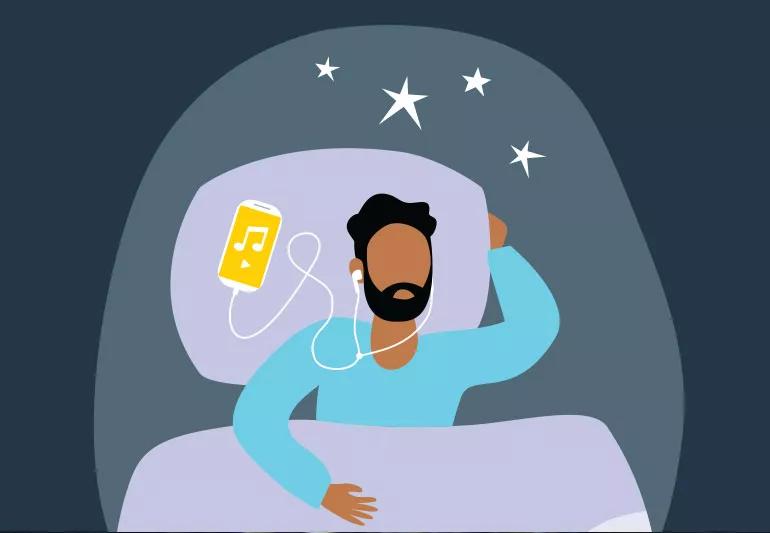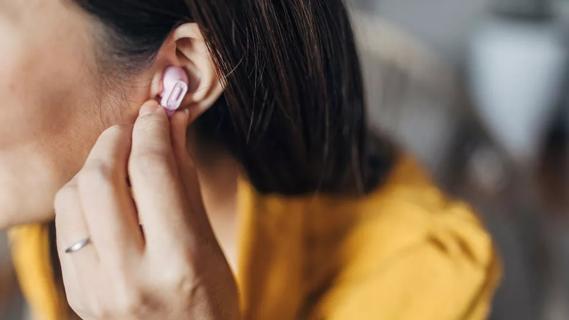You can fall asleep while wearing headphones as long as you follow these tips

Maybe you live in a city that never sleeps and the sound of sirens rip through the early morning hours. Or maybe you don’t get the chance to beat your partner to bed, so their snoring keeps you up at night. Rather than lose sleep over it, you grab your headphones and listen to soothing sounds of gentle rain to block out all the chaos.
Advertisement
Cleveland Clinic is a non-profit academic medical center. Advertising on our site helps support our mission. We do not endorse non-Cleveland Clinic products or services. Policy
But is sleeping with headphones on a good idea? Or are you risking causing damage to your ears even when you’re not listening to music?
Audiologist Valerie Pavlovich Ruff, AuD, explains why sleeping with headphones can be safe as long as you have the right kind of headphones and you keep the volume at a minimum.
If you’re trying to improve your sleep hygiene, there are several reasons why you may want to wear headphones while you sleep, including:
Dr. Pavlovich Ruff says people who tend to have ringing in their ears (tinnitus) are most commonly interested in sleeping with headphones because they want that ringing to stop so they can get a full night’s rest without interruption. There are a few things that can cause this ringing, including:
“Emotional stress can cause ringing in your ears, too,” says Dr. Pavlovich Ruff. “This is why many people might want to fall asleep listening to something soothing or relaxing just for stress relief.”
Advertisement
It’s possible to improve your sleep with headphones, or at least improve the way you settle into your bedtime routine. But Dr. Pavlovich Ruff says it boils down to wearing the right kind of headphones and how you intend to use them.
“What if your phone rings because someone is trying to reach you or there’s some other emergency happening around you?” asks Dr. Pavlovich Ruff. “Would you be able to hear those things? That would be my biggest concern.”
A good rule of thumb: If someone is standing within arm’s reach of you, they shouldn’t be able to hear what you’re listening to and you should be able to hear them speak to you without removing your headphones.
On average, most people can listen to sounds at 85 decibels for up to eight hours without any negative impact. But if you listen to anything above 85 decibels, you should cut your listening time in half for every 3 decibels you add. So, for instance, if you’re listening to something at 88 decibels, it’s only safe to do so for four hours. Dr. Pavlovich Ruff suggests turning your headphone volume to just over half or below and not wearing them for too long.
“The key here is the volume and the length of time you’re listening,” says Dr. Pavlovich Ruff. “You can listen to music all day long if it’s at a safe level, but if you’re listening at a very loud level, you can cause damage to your hearing in as little as 15 minutes.”
In one study involving self-reported hearing and listening habits, those who listened to music for more than three hours were more likely to have ringing in their ears. And 10% reported listening to music between 90 and 100 decibels for longer periods of time, even during sleep, which could increase their risk for future hearing impairments.
Plugging hard plastic earbuds, like AirPods®, in your ear may not be terrible in the short-term, but falling asleep with them could add discomfort. Plus, in-ear earbuds can lock moisture into your ear canal, especially if you’re headed to bed right after a shower. This can cause bacteria to grow and lead to external ear infections over prolonged periods. You can also build up too much earwax if you leave the in-ear headphones in for too long.
The last thing you want to do when you’re sleeping is get tangled up in cords or even accidentally nudge that volume level too high. Overall, you’ll want wireless over-the-ear headphones, which can provide more comfort because it’s not blocking your ear canal. There are even headbands that contain headphones, which wrap around your head for extra comfort.
Some of us may not have this next option if we share our living spaces with a partner or family members. But if you’re able, using an external speaker is ideal because it takes pressure off of your ears. Plus, you can set timers for certain devices to shut off after a period of time. That way, your listening is limited to those precious minutes just before you fall into a deep sleep.
Advertisement
Some side effects of wearing headphones can include damaging your outer and inner ear, including hearing loss.
You have glands in your outer ear canal that excrete wax to keep your ears moist so they’re not itchy or dry. It also stops debris from falling into your ear and reaching your eardrum. But when you push things into your ear, like cotton swabs or earbuds, you can actually push that wax farther back and cause it to compact. If this happens, you may experience ringing in your ears, slight hearing loss or feel like your ear canal is blocked.
“In some cases, you might have to have that ear wax removed by a physician,” notes Dr. Pavlovich Ruff.
When water gets trapped in your ear canal, bacteria can grow over time leading to an infection commonly called “swimmer’s ear.” This can happen if you swim regularly, of course, but it can also happen if you trap moisture in your ear for prolonged periods of time by wearing in-ear headphones or earplugs. If you have swimmer’s ear, your ear can appear red, itchy and painful. In some cases, you may have pus draining from your ear and your hearing can feel a bit muffled. In these situations, it’s important to keep your ear canal dry and see an ear, nose and throat (ENT) physician who can supply ear drops to help treat the infection.
Advertisement
If your headphones aren’t a good fit, you can damage the skin in your ear canal over time, which could lead to necrosis. This condition happens when there’s too little blood flow as a result of injury or trauma, so your skin cells die, leaving behind lesions or black and brown tissue.
“If you feel any pressure, pain or fullness in your ear, that could indicate your plug or earbud isn’t fitting you well,” says Dr. Pavlovich Ruff. “They can make custom sleeves for earbuds to make them more comfortable, but if you’re a side-sleeper, they may not be comfortable enough.”
If you’re set on gearing up for your next sleep cycle, you can sleep with headphones only if you’re willing to double down on over-the-ear headphones and keep the volume down when you’re wearing them. “I’d be cautious of how loud your volume is and how they fit,” advises Dr. Pavlovich Ruff. “I normally don’t recommend wearing headphones to bed, but if you have over-the-ear headphones or the headband style, that’s better for you than in-ear styles. Using an external speaker would be best.”
Advertisement
Learn more about our editorial process.
Advertisement

This dangerous practice can cause burns or a ruptured eardrum, and can make earwax blockages worse

Avoid poorly fitting gear, opt for quality devices and consider sound-limiting technology to help prevent noise-induced hearing loss

Care for your ears by steering clear of cotton swabs, taking precautions in loud settings and seeking medical help when needed

To avoid sleep deprivation and shift work sleep disorder, try adopting habits that minimize light exposure and prioritize daytime sleep

Sleep disorders, mental health conditions and other health concerns can all affect the quality of your sleep

Most people fall asleep within 10 to 20 minutes, but if your experience is different, adjusting your sleep schedule may help

This spinning sensation is a symptom, not a condition, so you need to know what’s causing it before you can treat it

Tart cherry juice contains natural compounds that may support better sleep

The tropical fruit is a good source of antioxidants and vitamin C

Most people fall asleep within 10 to 20 minutes, but if your experience is different, adjusting your sleep schedule may help

Exploring your hidden side can lead to better understanding of what makes you tick